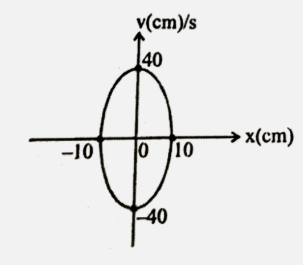If x,v and a denote the displacement, the velocity and the acceleration of a particle executing simple harmonic motion of time period T, then, which of the following does not change with time ?
a2T2+4π2v2
aT/x
aT+2πv
aT/v
The correct Answer is:B
Acceleration (a)=−ω2x
Since , ω2 is a constant
Hence, ax is constant and T also constant
∴aTx = constant
Similar Questions
If x, v and a denote the displacement, the velocity and the acceleration of a particle executing simple harmonic motion of time period T, then, which of the following does not change with time?
View SolutionDraw displacement-time, velocity-time and acceleration-time graphs for a particle executing simple harmonic motion. Discuss their phase relationship.
View SolutionIf x, v and a denote the displacement, the velocity and the acceleration of a particle executing simple harmonic motion of time period T, then, which of the following does not change with time?
View Solutionयदि x, v एवं a आवर्तकाल T में सरल आवर्त गति करते हुए किसी कण के विस्थापन, वेग तथा त्वरण को व्यक्त करते हैं तो निम्न में से कौन-सा परिवर्तित नहीं होता है?
View SolutionIf x, v and a denote the displacement, the velocity and the acceleration of a particle executing simple harmonic motion of time period T, then, which of the following does not change with time?
View SolutionObtain the formulae for displacement, velocity, acceleration and time period of a particle executing simple harmonic motion. When is the velocity of particle maximum and when zero ? Acceleration ?
View SolutionThe plot of velocity (v) versus displacement (x) of a particle executing simple harmonic motion is shown in figure. The time period of oscillation of particle is :-

View SolutionIf x, v and a denote the displacement, the velocity and the acceleration of a particle executing simple harmonic motion of time period T, then which of the following do not change with time?
View Solution

